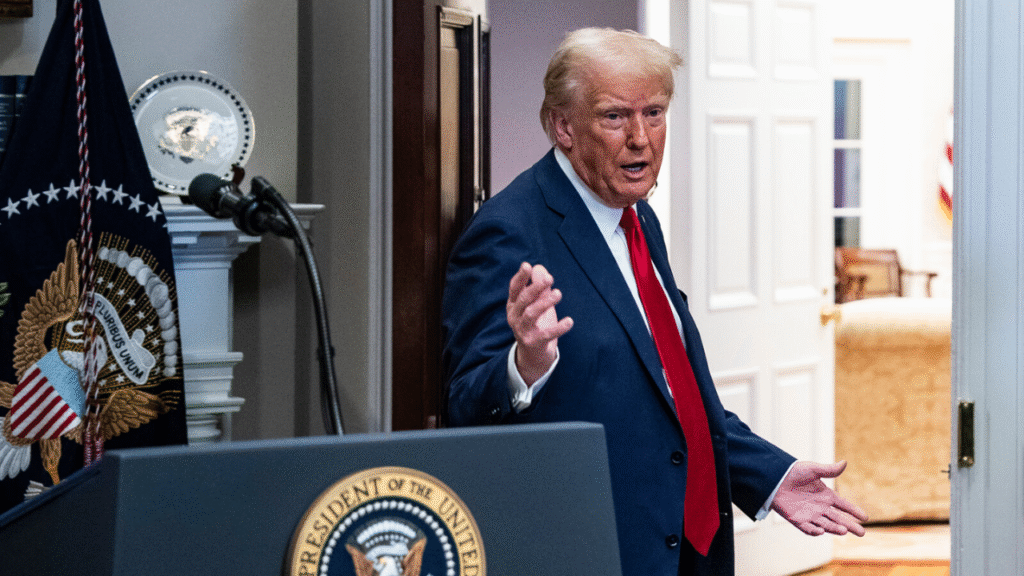A bipartisan effort to regulate cryptocurrency is facing serious backlash as revelations emerge linking the Trump family to a series of controversial crypto ventures. Critics say the growing web of financial interests poses a conflict of interest so severe that it could derail what was once considered a promising legislative breakthrough.
GENIUS Act on the Brink
At the heart of the issue is the Guiding Ethical Norms in the Use of Stablecoins Act known as the GENIUS Act a bipartisan bill designed to regulate stablecoins, a type of cryptocurrency pegged to the value of traditional currencies. Co-authored by Senators Kirsten Gillibrand (D-NY) and Cynthia Lummis (R-WY), the legislation initially garnered widespread support from both parties and the financial technology sector.
However, that support has begun to unravel in recent weeks as the Trump family’s extensive involvement in crypto ventures has come to light. According to Business Insider, the family has launched a meme coin, invested in a new stablecoin, may hold financial interests in major exchange Binance, and partnered with Crypto.com through Trump Media & Technology Group.
$2 Billion Foreign Deal Raises Alarms
The controversy reached a boiling point with reports of a $2 billion cryptocurrency deal involving the Trump family and a foreign government, a move that has sparked national security concerns and renewed fears of foreign influence.
Democrats argue that the deal undermines public trust and legislative credibility. “This is corruption,” one senior Democratic aide told Axios, referring to the Trump family’s growing crypto portfolio. In response, several Democratic lawmakers have withdrawn support for the GENIUS Act unless new national security and anti-corruption provisions are added.
For more context on congressional ethics standards, see the U.S. House Committee on Ethics and the Senate Select Committee on Ethics.
A New Legislative Response: The End Crypto Corruption Act
In direct response to the Trump family’s crypto activities, Senate Democrats have introduced a new bill titled the End Crypto Corruption Act. This legislation proposes prohibiting current and former U.S. presidents, members of Congress, and their immediate family members from holding or profiting from cryptocurrencies during and after their terms in office.
The bill would also require mandatory disclosures of digital asset holdings and increase transparency around crypto-related lobbying. Supporters argue that such measures are critical to restoring confidence in the legislative process and insulating public policy from personal financial gain.
“This is about integrity in government,” said Sen. Elizabeth Warren (D-MA), a longtime critic of the crypto industry. “If you’re in office or running for office, you shouldn’t be allowed to profit from the same assets you’re helping to regulate.”
Partisan Divide Reemerges
The Trump family’s actions have fractured the previously rare bipartisan consensus on crypto regulation. While Republicans have largely remained silent or downplayed the significance of the family’s crypto ventures, Democrats are demanding greater accountability and stricter ethical boundaries.
Several Democratic senators have paused negotiations on the GENIUS Act, refusing to move forward unless stronger anti-money laundering and foreign influence safeguards are included.
The Department of the Treasury and the Financial Crimes Enforcement Network (FinCEN) have not commented directly on the Trump family’s activities, though FinCEN has long advocated for tighter digital asset oversight.
Broader Implications for Crypto Regulation
The standoff has broader implications for the future of digital asset regulation in the United States. The crypto industry has lobbied heavily for clear rules of the road, and the GENIUS Act was viewed as a compromise between innovation and regulation.
But the current scandal has led some lawmakers to question whether comprehensive crypto legislation is even feasible without broader ethics reforms.
“The trust is gone,” said one congressional staffer involved in the negotiations. “Until we clean up these conflicts of interest, it’s going to be very hard to get anything meaningful passed.”
The Securities and Exchange Commission (SEC) and the Commodity Futures Trading Commission (CFTC) — the primary regulators of digital assets — have also called for expanded congressional authority. Their official positions can be viewed at the SEC and CFTC websites.
What Comes Next?
While it’s unclear whether the GENIUS Act will survive in its current form, the controversy has undeniably shifted the legislative landscape. Both parties now face increasing pressure to enact rules that not only govern technology, but also the ethical standards of those who wield power over it.
Conclusion
The Trump family’s growing involvement in cryptocurrency has injected controversy into what was once a broadly supported legislative effort. As lawmakers weigh the risks of financial conflicts and foreign entanglements, the future of the GENIUS Act and broader crypto regulation hangs in the balance. The situation underscores a fundamental challenge in U.S. governance: ensuring that public policy is shaped by the public interest, not private gain. What Congress does next could set lasting precedent for how America navigates the intersection of politics, power, and digital finance.

